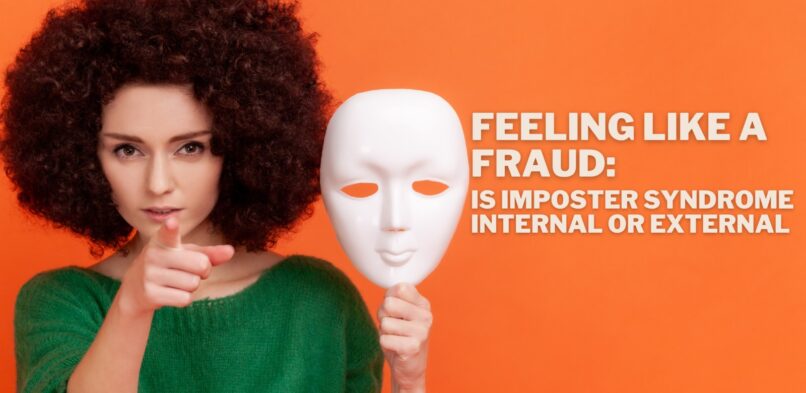Feeling Like a Fraud: Is Imposter Syndrome Internal or External?

Feeling Like a Fraud: Is Imposter Syndrome Internal or External?
May 23, 2024 No Comments on Feeling Like a Fraud: Is Imposter Syndrome Internal or External?Ever climbed the ladder of success, only to constantly worry you might be about to fall because you don’t deserve to be there? That sinking feeling in your gut that whispers “they’ll find out I’m a fake any minute” – that’s imposter syndrome. But where does this nagging doubt come from? Is it something we cook up in our own minds, or is it a response to external pressures?
The truth is likely a complex mix of both.
Internal Factors: The Voice of Self-Doubt
Imposter syndrome feeds on a distorted view of ourselves. We brush off accomplishments as luck or downplay our skills, convinced we’re intellectual phonies. This internal narrative can be driven by perfectionism (https://www.psychologytoday.com/us/basics/imposter-syndrome) – the relentless pursuit of flawlessness leading to self-criticism at every perceived misstep.
External Factors: The Societal Mirror
But our inner critic isn’t operating in a vacuum. Research suggests social factors play a role too. A 2008 study by McGregor et al. suggests imposter syndrome might be more prevalent among women, particularly women of color (https://www.betterup.com/blog/why-imposter-syndrome-can-be-a-competitive-advantage). This aligns with the idea that societal expectations can fuel self-doubt, especially for those who break traditional molds.
Another factor is education. A study in the Journal of Educational Psychology (Forsyth et al., 2018) found imposter syndrome to be more common among high-achieving students transitioning to more rigorous academic environments. Feeling like an imposter might be more intense during periods of significant personal or professional growth.
Finally, organizational culture can play a part. A culture of extreme competition or lack of mentorship can exacerbate feelings of inadequacy.
Imposter Syndrome vs. Self-Doubt
While imposter syndrome and self-doubt share some territory, they’re not identical twins. Self-doubt is a temporary questioning of our abilities, often prompting us to seek solutions. Imposter syndrome, however, is a persistent feeling of fraudulence, unshaken by evidence of competence.
Imposter syndrome can be a debilitating force, holding us back from reaching our full potential. Recognizing its origins, both internal and external, is the first step to overcoming it. By challenging our inner critic, acknowledging our accomplishments, and seeking support, we can silence the imposter and embrace the success we’ve earned.

Leave a comment